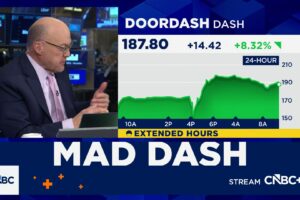
This past week, Donald Trump was once again elected president of the United States, which resulted in many anxious Americans scrambling to move to other countries. While some wealthy residents dove into citizenship-by-investment options, others searched for the once-popular digital nomad programs.
Searches for “digital nomad visa” climbed by 170% amidst the news, according to Centus’ analysis of worldwide Google search data for the week ending November 6. The localization-management platform noted that interest “spiked during the vote count.”
During the pandemic, remote workers attempting to capitalize on their flexibility took on a “digital nomad” lifestyle, where they could ostensibly travel and enjoy a lower cost of living. Between 2019 and 2022, the number of Americans identifying as digital nomads skyrocketed by 131%, per a report from consultant group MBO Partners.
But the lifestyle became less trendy over time. Companies clamping down on work-from-home setups with return-to-office mandates pumped the breaks on said phenomenon. In 2024, the number of American digital nomads that hold traditional jobs decreased by 5%, falling for the second year—per data from MBO Partners.
And the laptop-toting group received some recent criticism as perpetrators of gentrification.
“You come, and you say it’s really cheap… cheap for who? With time, as you show up, and then you tell your friends to show up and this place becomes a safe haven for digital nomads, you’re actually driving the cost of everything up,” Mechi Annas Estvez Cruz, writer and Dominican Republic native, told BBC.
In response to said overtourism and its economic implications, some countries backed away from their embrace of the digital nomad, or at least drew back the red carpet. Even so, it seems as if demand for moving abroad is rising once more, as the news of a Trump presidency breathed life into a somewhat faltering way of working and living. Looking at Google Trends for “digital nomad visa” from the past week, Fortune saw interest peaked on election night and remained high, though a bit lower, throughout the week. General interest seemed to rise as the simple search for “digital nomad” increased as well.
Separately, Centus ranked the states looking most for remote and digital jobs. The company used Google Keyword Planner to gauge search volume data between September 2023 and 2024 and the popularity of 169 unique and relevant keywords related to remote work. It appears as if swing states are the most likely to look for remote or digital-nomad gigs, perhaps pointing to a political divide which fuels the desire to move elsewhere.
-
Georgia
-
North Carolina
-
Florida
-
South Carolina
-
Tennessee
-
Virginia
-
Texas
-
Nevada
-
Arizona
-
Colorado
This story was originally featured on Fortune.com










